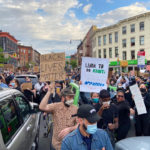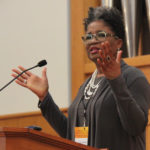WACO—Efforts to restrict teaching about the dangers of racism are “fundamentally anti-Christian,” researcher and author Robert P. Jones told a conference on racial healing.
More than three dozen states have introduced legislation or taken other steps to restrict public schools from teaching what politicians broadly refer to as “critical race theory.” Actually, the term refers to an academic field of study usually introduced in the second year of law school, Jones noted.
“It’s become a Rorschach test, shorthand for anything white people don’t like related to race,” said Jones, founding CEO of the Public Religion Research Institute.
Avoiding white ‘discomfort’
Most of the legislation mirrors a Florida bill that prohibits lessons about race that could make white students feel “discomfort,” he said, characterizing the notion as “just nuts.”
“It’s based on the fundamentally anti-Christian idea that white people should be comfortable at other people’s expense,” said Jones, who holds a Master of Divinity degree from Southwestern Baptist Theological Seminary and a doctorate in religion from Emory University.
“In the Baptist tradition, you don’t get saved without conviction of sin, and that is not a comfortable process.”
Jones presented the closing keynote address at a conference offered both online and at Baylor University’s Truett Theological Seminary titled, “Do you want to be healed? Racism in the White Church.”
Racism woven ‘into the fabric’
 Racist ideas are “incorporated into the fabric of American Christianity” to the degree that it is difficult for many white Christian Americans to disentangle “being white from being Christian,” said Jones, author of White Too Long: The Legacy of White Supremacy in American Christianity.
Racist ideas are “incorporated into the fabric of American Christianity” to the degree that it is difficult for many white Christian Americans to disentangle “being white from being Christian,” said Jones, author of White Too Long: The Legacy of White Supremacy in American Christianity.
Historically, “political secession had its dress rehearsal in Baptist and Methodist churches” that separated into northern and southern branches over issues related to slavery, he said.
Sign up for our weekly edition and get all our headlines in your inbox on Thursdays
Speaking as a white Christian raised and educated in Southern Baptist churches and institutions, Jones asserted racism continues to be part of the “DNA” of conservative white Christianity.
“We have not thought about what we already have lost,” he said. “This history is at our core.”
The desire to allow slaveholders to serve as missionaries is central to “the origin story” of the Southern Baptist Convention, he said.
However, he also pointed to PRRI research showing underlying racism is not unique to white evangelicals in the South. It also is prevalent among Roman Catholics in the Northeast and mainline Protestants in the Midwest.
Analyzing survey responses to a broad range of questions, the dominant expression of white Christianity in any region is “the carrier” of the disease of white supremacist ideas in that area, he said.
‘Hyper-individualistic’ approach
Looking at the issue theologically, Jones blames a “hyper-individualistic” approach to religion—focusing on a personal relationship between “me and white Jesus” without regard to Christian teaching about community and society.
In particular, he asserted, this version of Christianity emphasizes personal morality without regard to how sin permeates institutions and systems. So, it may see racism as a personal sin that demands a change in behavior but denies the existence of institutional racism.
Examining the same data through the lens of sociology, he observed, “Race and religion are intertwined with partisanship.” He pointed particularly to how white Christian nationalism has embraced “ethnic and religious identity politics.”
Jones recommended white Christians talk about reparation and healing rather than racial reconciliation.
The idea of reconciliation suggests both parties—African American and white—share equal responsibility for the problem of racism and that the problem can be solved by improving interpersonal relationships, he observed.
Instead, he suggested white Christians take the lead in repairing the damage caused by unjust systems they created and worked hard to perpetuate.
Jones offered two key actions for white Christians to take: “Tell the truth—the whole truth—about our history, with no two-stepping around it. And love our neighbors—all our neighbors.














We seek to connect God’s story and God’s people around the world. To learn more about God’s story, click here.
Send comments and feedback to Eric Black, our editor. For comments to be published, please specify “letter to the editor.” Maximum length for publication is 300 words.